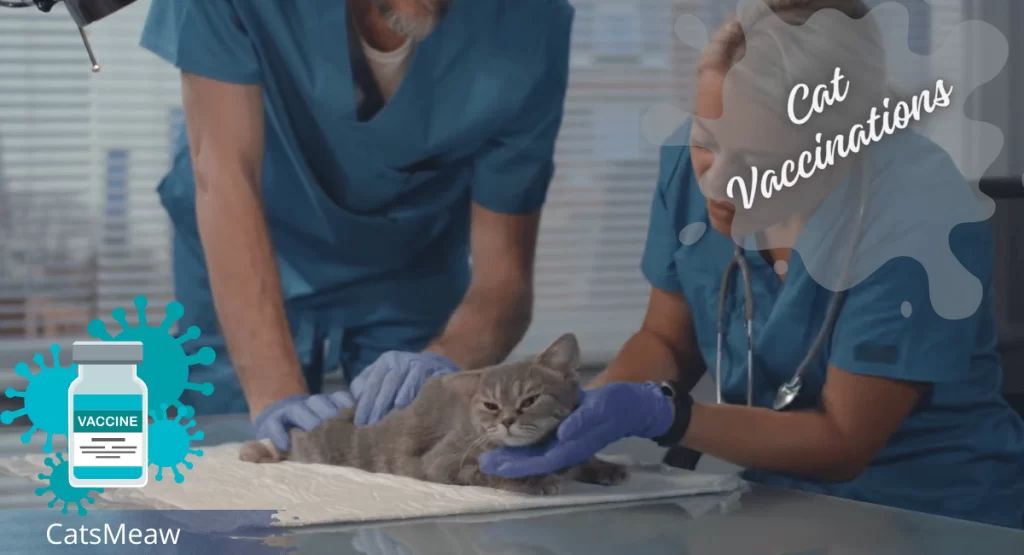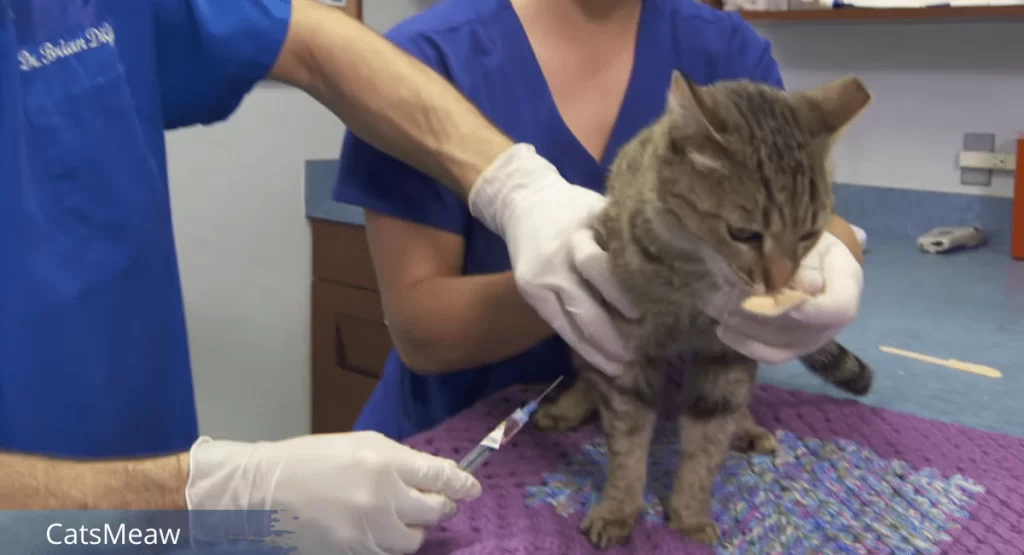As a responsible pet owner, it is crucial to prioritize the health and well-being of our feline companions. One of the most effective ways to protect our cats from a range of infectious and potentially life-threatening diseases is through vaccinations. Cat vaccinations play a vital role in safeguarding our pets, ensuring they live long and healthy lives.

In this comprehensive guide, we will explore the importance of cat vaccinations, the common vaccines available, vaccination schedules for kittens and adult cats, potential risks and side effects, how to prepare your cat for vaccinations, finding a reliable veterinarian, the cost of vaccinations, financial assistance options, other preventive measures for cat health, and answer frequently asked questions about cat vaccinations.
Table of Contents
The Importance of Cat Vaccinations
Cat vaccinations are essential as they provide immunity against a variety of diseases that can be fatal or lead to severe illness in cats. Vaccines work by stimulating the cat’s immune system to produce antibodies that fight off specific pathogens. By preventing infection or reducing the severity of the disease, vaccinations can save your cat’s life and spare them from unnecessary suffering.
Not only do cat vaccinations protect your beloved pet, but they also contribute to the overall health of the feline population. Vaccinated cats are less likely to transmit contagious diseases to other cats, ultimately creating a safer environment for all feline companions.
Common Cat Vaccinations and Their Benefits
Several vaccinations are available to protect cats from various diseases. The core vaccines, recommended for all cats, include the rabies vaccine and the FVRCP vaccine (which stands for feline viral rhinotracheitis, calicivirus, and panleukopenia). These vaccines are crucial in preventing highly contagious and potentially fatal diseases.
The rabies vaccine is not only important for your cat’s health, but it is also required by law in many areas due to the zoonotic nature of the disease. The FVRCP vaccine protects against three common respiratory diseases in cats. Rhinotracheitis, calicivirus, and panleukopenia can cause severe illness and even death, especially in kittens and cats with weakened immune systems.
In addition to core vaccines, there are non-core vaccines available for specific circumstances and environments. These may include vaccines for feline leukemia virus (FeLV), feline immunodeficiency virus (FIV), and others. Your veterinarian can guide you in determining if these vaccines are necessary for your cat based on their lifestyle and risk factors.
Vaccination Schedule for Kittens and Adult Cats
The vaccination schedule for kittens typically begins at around six to eight weeks of age. Kittens receive a series of vaccines, usually spaced two to four weeks apart, until they are around 16 weeks old. This schedule ensures that kittens are protected during their vulnerable early months when they are more susceptible to diseases.
Our pick: Essentials Cat Supplies
Adult cats who have not received vaccinations or have an unknown vaccination history may require a similar initial series of vaccines. However, the specific schedule may vary depending on the cat’s age, health status, and risk factors. Your veterinarian will assess your cat’s needs and recommend an appropriate vaccination schedule.
It is important to note that vaccinations are not a one-time event. Cats require regular booster shots to maintain their immunity. Your veterinarian will provide a personalized vaccination plan for your cat, including the recommended frequency of booster shots for each vaccine.
Risks and Side Effects of Cat Vaccinations
While cat vaccinations are generally safe and well-tolerated, there can be risks and potential side effects. Most cats experience minimal side effects, such as mild swelling or discomfort at the injection site, which usually resolve quickly. However, in rare cases, more serious reactions can occur, including allergic reactions, anaphylaxis, or injection site tumors.
Related: Best Way To Know if Your Cat is in Pain
It is important to discuss any concerns or potential risks with your veterinarian. They can provide detailed information about the specific vaccines and their potential side effects. Your veterinarian will also help assess your cat’s individual risk factors and provide guidance on minimizing risks while ensuring the necessary protection through vaccinations.
How to Prepare Your Cat for Vaccinations
To ensure a smooth and stress-free vaccination experience for your cat, there are several steps you can take to prepare them beforehand. Start by acclimating your cat to their carrier, making it a comfortable and familiar space. This will help reduce anxiety during the trip to the veterinarian’s office.
Additionally, schedule the appointment at a time when your cat is generally calm and relaxed. Avoid feeding your cat immediately before the visit, as an empty stomach may help prevent nausea or vomiting during the car ride. Bring along your cat’s favorite toys or treats to provide comfort and distraction during the visit.
Inform your veterinarian about any previous adverse reactions to vaccines or any health conditions your cat may have. This information will help them tailor the vaccination process to minimize any potential risks.
Finding a Reliable Veterinarian for Cat Vaccinations
Choosing a trustworthy and experienced veterinarian is crucial when it comes to cat vaccinations. Start by asking for recommendations from friends, family, or fellow cat owners. Look for a veterinarian who specializes in feline care or has a good reputation for providing excellent medical services to cats.
During your first visit, assess the clinic’s cleanliness, the veterinarian’s knowledge and communication style, and the overall atmosphere. A cat-friendly environment with knowledgeable and caring staff can make a significant difference in your cat’s vaccination experience.

Additionally, consider whether the veterinarian offers other essential services, such as routine check-ups, dental care, and emergency services. A comprehensive veterinary clinic can provide your cat with comprehensive care throughout their life.
The Cost of Cat Vaccinations and Potential Financial Assistance Options
The cost of cat vaccinations can vary depending on several factors, including the type of vaccine, your location, and the veterinary clinic you choose. It is important to budget for these vaccinations as they are crucial for your cat’s health and well-being.
If you are concerned about the cost of vaccinations, there may be financial assistance options available. Some animal welfare organizations, local shelters, or nonprofit groups offer low-cost or free vaccination clinics for cats. Additionally, pet insurance can help cover the cost of vaccinations and other veterinary expenses. Research different insurance providers to find a plan that suits your needs and budget.
Remember, while the initial cost of vaccinations may seem significant, it is a small price to pay compared to the potential expenses associated with treating a preventable disease or managing a chronic illness in your cat.
Other Preventive Measures for Cat Health
In addition to vaccinations, there are other preventive measures you can take to ensure the overall health and well-being of your cat. Regular veterinary check-ups, a balanced diet, proper hydration, regular exercise, and good hygiene practices are all essential components of maintaining a healthy cat.
Related: 3 Signs of Tumor in Cats
Keep your cat indoors to minimize exposure to infectious diseases, parasites, and potential accidents. Provide a stimulating environment with toys and scratching posts to keep your cat mentally and physically active. Additionally, maintain a clean litter box and practice proper hand hygiene to reduce the risk of zoonotic diseases.
Frequently Asked Questions About Cat Vaccinations
- Q: Are cat vaccinations necessary if my cat is strictly indoors?
- A: Yes, even indoor cats can benefit from vaccinations. Vaccinations protect against diseases that can be transmitted through contact with humans, other animals, or contaminated objects.
- Q: Are there any alternatives to vaccinations?
- A: Vaccinations are the most effective preventive measure against infectious diseases in cats. While there may be alternative treatments for specific diseases, they are often less reliable and may not provide the same level of protection.
- Q: Can my cat have an adverse reaction to vaccinations?
- A: While rare, cats can have adverse reactions to vaccinations. However, the benefits of vaccinations far outweigh the risks. Discuss any concerns with your veterinarian to ensure your cat’s safety.
Conclusion
Cat vaccinations are crucial for safeguarding the health and longevity of your feline companion. By providing immunity against a range of diseases, vaccinations protect your cat from unnecessary suffering and contribute to the overall well-being of the feline population.
Ensure your cat receives the necessary vaccinations according to the recommended schedule. Discuss any potential risks or concerns with your veterinarian, and take proactive steps to prepare your cat for vaccinations. Find a reliable veterinarian who specializes in feline care and consider financial assistance options if needed.
Remember, vaccinations are just one aspect of maintaining your cat’s health. Embrace a holistic approach by prioritizing regular veterinary check-ups, a balanced diet, exercise, and good hygiene practices. By taking these preventive measures, you are giving your beloved pet the best chance at a long and healthy life.
